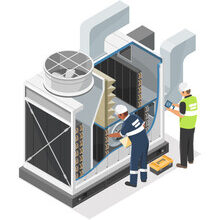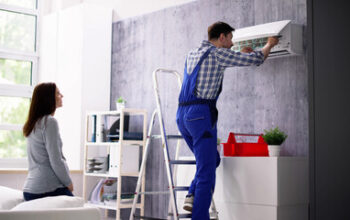Air conditioning services cover any service performed on the systems that keep your home comfortable in winter and cool in summer. These systems are more than just temperature control; they also purify indoor air to ensure your health and wellness.
HVAC systems require regular maintenance to extend their lifespan. During this process, technicians can identify minor problems and make repairs immediately to avoid bigger problems. Make sure to call All Temp Air Conditioning & Refrigeration experts for a proper service.
 The air filters used in your HVAC system are designed to remove impurities from the air circulating through your home. This process can help you reduce respiratory problems like asthma, as well as other allergies and diseases ranging from bronchitis to pulmonary fibrosis. Air filters are available in a variety of materials, including fiberglass and fabrics. They are rated according to the Minimum Efficiency Reporting Value (MERV), which measures how effective they are at trapping pollutants as small as 0.3 microns.
The air filters used in your HVAC system are designed to remove impurities from the air circulating through your home. This process can help you reduce respiratory problems like asthma, as well as other allergies and diseases ranging from bronchitis to pulmonary fibrosis. Air filters are available in a variety of materials, including fiberglass and fabrics. They are rated according to the Minimum Efficiency Reporting Value (MERV), which measures how effective they are at trapping pollutants as small as 0.3 microns.
Different types of air filters have different pros and cons, depending on your needs. Some are more effective than others at eliminating certain pollutants, such as odors or pet dander. Others have special features, such as UV lights that kill bacteria and viruses. Some are reusable while others are disposable.
Choosing the right filter starts with knowing your HVAC system and its specifications. Filters are sized by their height and length combinations, but they also have thicknesses that vary from one inch to six inches. When purchasing new filters, it’s important to get an exact match to prevent them from clogging or restricting airflow. To do this, simply remove the current filter and check the dimensions printed on its frame.
There are two main types of filters: spun glass and pleated filters. Spun glass filters are inexpensive and easy to find, but they have a low MERV rating and can be easily clogged by dust and other particles. They are best for homeowners who don’t have strong preferences in air filtration or need specific specialty filters.
Pleated filters are made from polyester fabric or cotton folds and have a higher MERV rating than spun glass filters. They can also be more resistant to clogging and have better overall air filtration than spun glass filters.
Another benefit of pleated filters is that they require less cleaning than spun glass filters, which can lead to a reduction in your energy costs. However, it’s important to clean or replace them regularly to avoid growing mildew and mold.
A thermostat is an incredible little device that helps your AC system disperse air throughout your home. Unfortunately, like all mechanical devices, it can break down or stop working properly over time. Fortunately, your technician can either fix it or replace it if necessary during an air conditioning maintenance service.
The basic function of a thermostat is to monitor the temperature of its environment and activate another device, such as your air conditioner, when that temperature reaches a certain level. To accomplish its job, a thermostat has small metal coils that expand and contract with the changing temperatures and send an electrical signal when they do so.
If the thermostat breaks down, your air conditioner will fail to turn on and the cooling process will stop altogether. This is a good reason to have your air conditioner checked regularly to prevent expensive repairs down the road.
As a part of your air conditioning service, your technician will check the thermostat to make sure it is delivering accurate readings. They will also look for it to be located in an appropriate place, such as not in direct sunlight or near a window, door, or air vent where the readings may be inaccurate.
Thermostat technology continues to evolve and there are now a wide variety of products available. Your technician will be able to help you choose a new thermostat that will suit your needs best. For example, a programmable thermostat can save you money by automatically adjusting the temperature according to your schedule. Other options include light-sensing thermostats, which adjust the temperature based on the lighting in a room, and electromechanical thermostats, which are the easiest to operate.
In addition to repairing or replacing your thermostat, the technicians at your air conditioning company will check other parts of your system, such as the condensation drain and the refrigerant lines. They will look for signs of wear and tear or damage and tighten any loose electrical connections, which can be a safety hazard and help prolong the lifespan of your system. In addition, they will likely clean the condensate drain to prevent any blockages that could lead to water leaks.
Humidity is a term used to describe the amount of water vapor in the air. It can be measured in terms of absolute humidity, relative humidity, or specific humidity. All three are important concepts to understand when it comes to regulating indoor air conditions.
A humid environment is a perfect breeding ground for bacteria, mold, and mildew. These organisms can aggravate existing respiratory and allergic problems. They can also contribute to peeling wallpaper, warped wood, and other structural issues. When left uncontrolled, these issues can become quite costly to repair and replace.
Air conditioning services can help regulate indoor air humidity levels. They can do so by addressing the source of the issue, rather than simply treating the symptoms. This can often be as simple as running ventilation fans in areas of high humidity, such as bathrooms and kitchens. Keeping humidity below 50% will keep your building cool while helping to prevent the growth of mold, mildew, and other harmful organisms.
Another air conditioning service that can help is dehumidification. This is done by adding additional components to the air conditioner that will remove excess moisture from the air. This can be done by utilizing refrigerant coils or desiccant materials such as silica gel beads.
Ultimately, the best way to monitor humidity is by using a hygrometer. These are available at most home improvement stores and will provide you with a clear reading of the current condition of the air in your house.
Humidity is important to regulate because it reflects the amount of moisture in the air at a given temperature. This is why it is often more useful to consider humidity about temperature, as opposed to just considering the overall vapor pressure of the air.
To ensure proper humidity control, it is important to have regular air conditioner maintenance. This will include an inspection and cleaning of all system components. This will help to keep humidity at a normal level, which will reduce the potential for condensation and optimize system performance. This can also help to reduce energy bills by reducing the strain on the cooling system during hot, humid summer weather.
Air conditioning services help to regulate temperature in a home or office. Keeping your AC unit clean and well-maintained is an essential part of optimum performance. The best way to do this is with seasonal maintenance. During this service, your technician will clean the outdoor coil and inspect the unit for any issues or damage. Additionally, your technician will change the air filter to ensure that you are getting maximum performance from your unit.
This service is important in many areas, especially in the workplace, where a stable temperature environment can make all the difference to productivity and comfort. Temperature control systems are used in a variety of HVAC applications including regulating the heating and cooling of a building and allowing for humidification adjustments.
A simple temperature control system usually involves a sensing device that compares the current state of an airflow in a space to a desired state and draws a conclusion about what needs to be done (e.g. start the blower). The more sophisticated setups, however, allow for zoned heating and cooling of rooms in a building, which can lead to huge gains in energy efficiency and reduced overall strain on the HVAC equipment.
Other tips to improve the temperature control in your home include shutting blinds during the day to reduce unwanted heat from sunlight; adjusting the thermostat in the evening so that it will automatically cool down; adding weather stripping around windows and doors; cleaning the outdoor coil of your air conditioner to improve airflow and reduce heat transfer; and avoiding over-use of appliances that generate heat, such as ovens and dryers.


